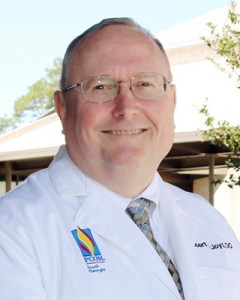Residency programs
are next step after
medical school
Published 5:02 pm Friday, June 27, 2025
MOULTRIE — Medical training doesn’t end after graduates finish medical school. It is an ongoing process, so where does it start? After medical school, graduates go through a residency program to start their post-graduate career.

Robert Lloyd, DO, FACOS, interim dean of the Osteopathic Medicine Program at PCOM, assistant dean of clinical education and associate professor of surgery, said, “Residency is when a graduate goes on to specialize in a specific medical field, whether it be in family medicine, internal medicine, general surgery.”
He said, “The graduates will go on to graduate medical education or GME. Most residencies can last from three to five years or longer depending on the specialty. At that point, the physician has a training license and is licensed to practice under the supervision of that program. They receive their education in their specific area of expertise.”
All physicians go through a residency program, specialize and are board certified in their field. Most states and hospitals require graduates to be board certified to practice medicine.
All graduates must participate in the “Residency Match” program. This allows graduates to apply in the “Match” system and rank their specialties and programs. Sometimes programs will rank the graduates in the systems.
As Lloyd said, “The system and its algorithm is kinda like The Dating Game. You put your information in and it gives you a result.”
He also said, “Most graduates get their first pick, and some graduates get their third or fourth pick. It depends on how high of a demand there is for that specific program. Some programs can get very competitive, so it is harder to get into those programs.”
Usually by Monday of Match Week, most graduates match with a residency program. However, a small percentage of graduates are not picked in the first round. They can apply for the Supplemental Offer and Acceptance Program (SOAP) and then they match with a program. By Friday of “Match Week,” 99% of all graduates match with a residency program.
Graduates can match to facilities all over the country from large cities to small rural areas that have GME programs.
Lloyd said, “With the expansion of medical education and colleges like PCOM that are in areas that are in need like South Georgia, there also has to be hospitals, like CRMC, in the neighboring areas to receive the newly matched graduates.”
He added that, “For the past 10 years, CRMC has been a strong supporter of PCOM and its graduates.”
According to Colquitt Regional Medical Center’s website, the hospital has two residency programs, which are the Georgia South Family Medicine Residency Program and the Georgia South Psychiatry Residency Program. The Accreditation Council for Graduate Medical Education (ACGME) has accredited both of these residency programs. Their focus is on providing training in rural and underserved communities.
The Family Medicine program, established in 2016, has a strong reputation for excellence in rural healthcare training, while the Psychiatry program, established in 2022, addresses the growing need for mental healthcare professionals in the region.
Other hospitals in the region have residency programs too. Phoebe Putney Memorial Hospital in Albany has a Family Medicine Residency Program.
South Georgia Medical Center in Valdosta has an Internal Medicine residency program and a relatively new Family Medicine residency program, both in partnership with Mercer University School of Medicine. SGMC also has a Transitional Year program to ease recent graduates from medical school into residencies in their specialties.
John D Archbold Hospital in Thomasville has an Internal Medicine Residency.
Tift Regional Medical Center in Tifton is launching new residency programs in internal medicine and obstetrics/gynecology in 2026.
Lloyd said most residents either start their medical careers where they grew up or they stay where they have done their training and continue their career.
“Lately, most of the students who have trained in the South Georgia area have decided to stay. Therefore, this will grow cities and towns in the area and also increase the number of physicians in this area,” he said. “At least one PCOM graduate stays in their residency program per year.”
According to Lloyd, the Philadelphia College of Osteopathic Medicine in Suwanee has also had graduates from that campus come down and do their training here in South Georgia.
“This happened before the South Georgia Campus was built. Those graduates have come down here, done their training, decided to stay and most are still here,” he added.
With the growing number of residency programs in the area, there is a need for more trained medical professionals to fill these spots. PCOM South Georgia is working to meet that need.





